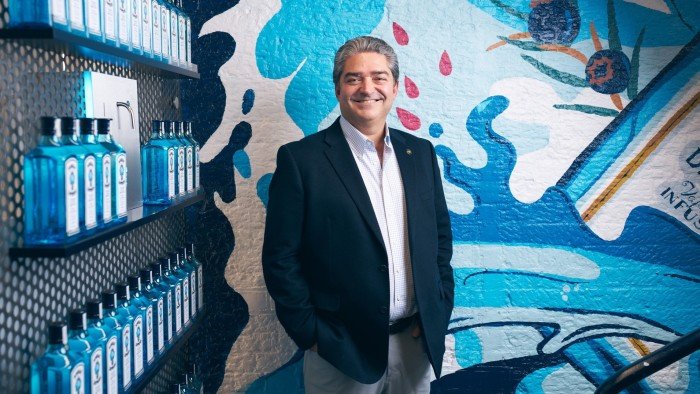Bacardi has brushed off the threat of moderating alcohol consumption and signalled that it has no plans to pursue asset disposals, despite the gloom that pervades the spirits sector.
Ignacio “Nacho” Del Valle, Bacardi’s head of Europe and Latin America and the member of the Bacardi dynasty with the most senior executive role at the business, said he did not believe the alcohol industry was in structural decline.
“Consumer trends do change but [the] data that is out there does not validate that we are adjusting [to anything] other than a cycle,” Del Valle said, referencing analyst research linking the slowdown in alcohol sales to weaker macro economic conditions.
His comments come as concerns plague the alcohol industry that moderation, health concerns, cannabis use and online socialising are driving a structural decline. Like rivals, Bermuda-based Bacardi has suffered from falling sales since a pandemic surge when consumers splashed out on high-end booze during lockdowns.

Net revenues at the privately owned group, which as well as Bacardi rum owns brands, including Martini, Grey Goose vodka, Patrón tequila and Bombay Sapphire gin, fell 3 per cent in its 2024 financial year, according to the latest available figures published by rating agency Fitch. Sales in North America, which makes up about half of group revenues, fell in the mid-to-high single digits.
Larger competitors Diageo and Pernod Ricard reported sales declines of 1.4 per cent and 1 per cent respectively in their 2024 fiscal years, while Diageo’s North America sales declined 2 per cent.
Del Valle indicated that Bacardi had no plans to offload any of its brands, unlike Diageo, which is reviewing its portfolio to identify potential disposals to lower its leverage. “I’ve now been [at Bacardi] for 29 years, and I’ve never had the conversation on selling,” Del Valle said.
“It might hurt others — not us,” he said of the pressures on the industry, reasoning that because Bacardi is privately owned it does not have to take drastic measures during downturns to appease investors.
“We know there’s a bad cycle today, but we won’t do anything wrong today to survive until tomorrow . . . ,” Del Valle said. “While others might need to report something in a way where they might take a shortcut, we will not do that.”
Diageo last month unveiled a $500mn cost-cutting programme and said it was considering major disposals, three months after scrapping its midterm growth target. This month, Rémy Cointreau abandoned its 2030 sales growth target while Jack Daniel’s maker Brown-Forman’s share price slumped 18 per cent after it reported worse than expected results.
Bacardi has accumulated substantial debt over the past two years after raising its stakes in Teeling whiskey and Ilegal mezcal, bringing its debt to earnings ratio significantly higher than its target.
Earnings before interest, tax, depreciation and amortisation were roughly $1.2bn in 2024 and are expected to rise to $1.3bn by 2026, according to Fitch’s most recent forecasts.
The company had net debt of $5.16bn as of the end of March 2024, 4.3 times its earnings, according to Fitch, compared with 3.2 times in 2022 and a long-term target of 3 times.
Del Valle said the group was not looking to make further acquisitions.
“I think we have what we need in terms of a portfolio, but we’ll always keep an eye out for innovation,” he said, adding that the company would be developing products within established categories, rather than entering new ones.
Del Valle said that while consumers were moderating their alcohol consumption, there were still opportunities for growth in “premiumisation” — in which drinkers drink less, but pricier spirits — and what he described as a shift towards daytime drinking.
The group has jumped on the spritz trend with its St Germain elderflower liqueur, used in “Hugo” spritzes, and Martini Bianco, used in vermouth spritzes, and has also entered the fast-growing ready-to-drink category with its Bacardi-and-Cola cans.
Bacardi was founded in 1862 in Santiago de Cuba by Don Facundo Bacardí Massó, who built the company’s first rum distillery. In the years leading up to Fidel Castro’s revolution, the family began moving its trademarks and production out of Cuba.
The company’s remaining assets in the country were expropriated by Castro’s government in 1960. Five years later, it established new headquarters in Bermuda, where the group is still based.
Del Valle, like longtime chair Facundo Bacardi, is a great-great grandson of the company’s founder. He is in a strong position to eventually run the group, according to analysts and people familiar with the company. The group’s chief executive is Mahesh Madhavan, who assumed the role in 2017.
He said Bacardi punched above its weight. “It’s a small company seen as a big one, because our brands do have a big global footprint,” he said. “We act fearlessly because we’re up against giants.” The company employs 8,000 people globally, compared with 30,000 at Diageo and almost 20,000 at Pernod Ricard.
Del Valle added that speaking with his older relatives about past crises the company has weathered, including the expropriation of its Cuban assets, put today’s challenges into perspective.
“Are we living in difficult times? Maybe there’s some adversity, maybe there’s some challenges out there, but we continue to grow.”

